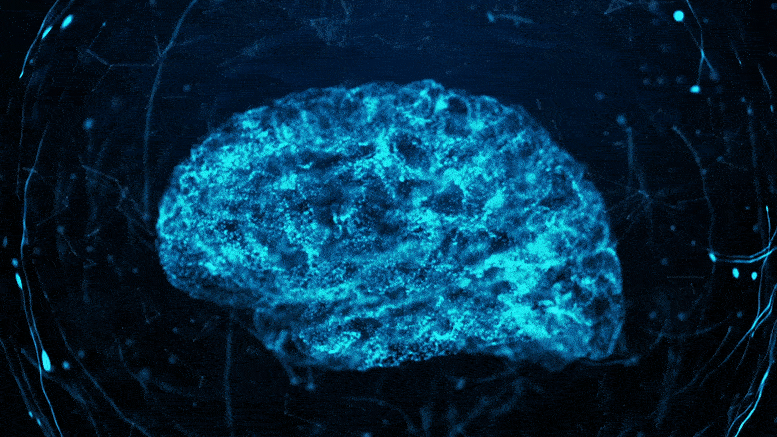A team of UCLA-led scientists reports on why sleep is important to our health and how the brain heals during sleep.
In a very early life, sleep helps build the infrastructure of the brain, but then takes on a completely new role in eliminating interference.
Prolonged sleep deprivation can lead to serious health problems for humans and other animals. But why is sleep so important to our health? A team of UCLA-led scientists answered this question and showed for the first time that the purpose of sleep changes dramatically around the age of two and a half.
Before this age, the brain grows very quickly. During REM sleep, when vivid dreams occur, the young brain is busy building and strengthening synapses – the structures that connect neurons together and enable them to communicate.
“Don’t wake babies during REM sleep – their brains do important work while they sleep,” said lead study author Gina Poe, a UCLA professor of integrative biology and physiology who has been researching sleep for more than 30 years.
After two and a half years, however, the main purpose of sleep shifts from building the brain to maintaining and repairing the brain, a role it plays for the rest of our lives, the scientists report in the journal on September 18, 2020 Advances in science. This transition, say the researchers, corresponds to changes in brain development.
All animals naturally experience some neurological damage during waking hours, and the resulting debris, including damaged genes and proteins in neurons, can build up and cause brain disease. Sleep helps repair this damage and clean up the debris – essentially discharging the brain and removing the junk that can lead to serious illness.
Almost all brain repair occurs during sleep, according to lead author Van Savage, a UCLA professor of ecology and evolutionary biology and computational medicine, and his colleagues.
“I was shocked at how big the change is in a short space of time and that this change happens when we’re this young,” said Savage. “It’s a transition that is analogous when water freezes into ice.”
The research team, which included scientists with expertise in neuroscience, biology, math, and statistics, performed the most comprehensive statistical analysis of sleep to date, using data from more than 60 sleep studies in humans and other mammals. They examined data on sleep throughout development – including total sleep time, REM sleep time, brain size, and height – and built and tested a mathematical model to explain how sleep changes with brain and body size.
The data was remarkably consistent: all species experienced a dramatic decline in REM sleep as they reached the human evolutionary equivalent of about two and a half years. The proportion of time spent in REM sleep before and after that point was roughly the same, regardless of whether the researchers studied rabbits, rats, pigs, or humans.
REM sleep decreases with increasing brain size throughout development, the scientists found. While newborns spend about 50% of their sleep time in REM sleep, this drops to about 25% by the age of 10 and continues to decrease with age. Adults older than 50 years sleep in REM for approximately 15% of their time. The significant drop in REM sleep at around two and a half occurs exactly when the major change in the function of sleep occurs, Poe said.
“Sleep is just as important as food,” said Poe. “And it’s wonderful how well sleep meets the needs of our nervous system. Everyone from jellyfish to birds to whales sleeps. Our brains don’t rest while we sleep. ”
Chronic lack of sleep likely contributes to long-term health problems like dementia and other cognitive disorders, diabetes, and obesity, to name a few, Poe said. If you feel tired, she said, don’t fight it – go to bed.
“I fought sleep in college and dragged through all night and now I think that was a mistake,” said Savage. “I would have been better off with a good night’s sleep. If I’m tired now, sleeping is not my fault. ”
For most adults, seven and a half hours of sleep a night is normal – and awake time doesn’t count, Poe says. While children need more sleep, babies need a lot more, roughly twice as much as adults. The high percentage of REM sleep in babies is in stark contrast to the amount of REM sleep observed in adult mammals over an enormous range of brain and body sizes. Adult people have five REM cycles during a full night of sleep and may have some dreams in each cycle.
A good night’s sleep is excellent medicine, says Poe. And it’s free.
Reference: “Uncovering Why We Sleep: Quantitative Analysis Shows Abrupt Transition From Neural Reorganization To Repair In Early Development” by Junyu Cao, Alexander B. Herman, Geoffrey B. West, Gina Poe, and Van M. Savage, September 18, 2020 , Advances in science.
DOI: 10.1101 / 827212
The study is co-authored by Junyu Cao, who did research in Savage’s laboratory and is now an assistant professor at the University of Texas at Austin. Alexander Herman, Assistant Professor of Psychiatry at the University of Minnesota, Twin Cities; and Geoffrey West, a physicist who is the Shannan Distinguished Professor at the Santa Fe Institute.
Sources of funding included the National Science Foundation and the Eugene and Clare Thaw Charitable Trust.



